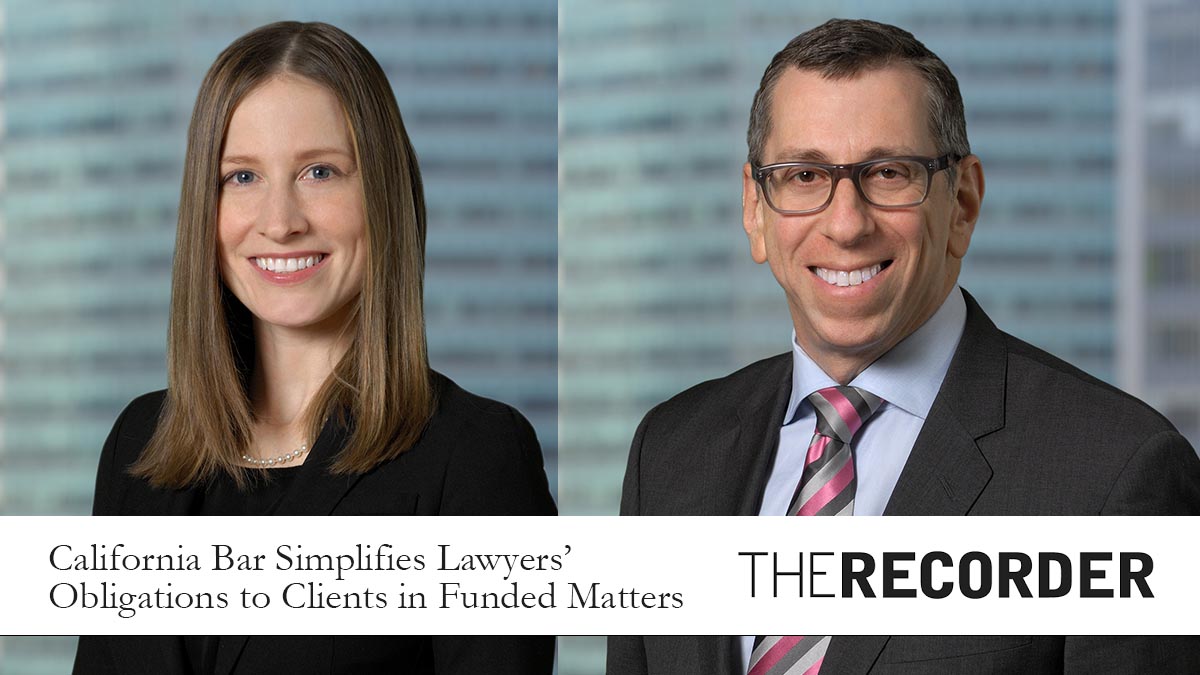October 21, 2020
Lawyers and clients alike will benefit from the State Bar committee's guidance on how to safely navigate the ethical rules while preserving litigants' access to the courts.

Originally Printed in The Recorder October 21, 2020
The opinion highlights several important themes.
First, as the committee notes, lawyers have always been obligated under Rules 1.7 and 2.1 to identify and manage limits to their independent professional judgment on their own. It’s hard to imagine why such self-regulation should be any harder where a lawyer merely has a preexisting relationship with a funder than, say, where a lawyer has a significant contingency interest in the litigation itself. The State Bar accordingly declined to draw any bright-line rules around a lawyer’s relationship with a funder (save for the rare occasion where a lawyer owns a share in the litigation funding company, in which case Rule 1.8.1 applies). Instead, it left the question largely to the attorney’s own judgment.
Second, the committee declined to draw bright-line rules around the degree of control a funder may exercise over litigation strategy: “The committee does not reach a general conclusion that any particular degree of control [over litigation strategy] is per se unethical. However, it is clear that where the funder has some degree of control of the litigation, the lawyer has an obligation to advise the client about the impact of such limitations on the lawyer’s representation.” In reaching its conclusion, the opinion emphasized that a lawyer’s ability to exercise independent judgment is not necessarily impaired in similar situations, such as when an insurer imposes limitations upon the lawyer’s representation of the insured, or when a plaintiff contractually grants strategic direction over litigation to a funder.
The committee’s conclusion that there is no per se limit on funder direction of litigation is surprising in that commercial funders rarely claim any control over litigation decisions. The opinion and its reasoning may well create the opportunity for a more nuanced discussion of the issue.
But the committee’s conclusion emphasizes the third important theme of its opinion, which is that there are few, if any, ethical issues in the funding context that cannot be remediated through disclosure and the informed written consent of the client. As the opinion’s analysis reiterates, an attorney’s ethical lodestar is to always pursue the client’s best interest and obtain informed client consent wherever needed.
This is true even with respect to Rule 1.6—concerning the lawyer’s duty of confidentiality—which is a frequent source of concern for attorneys unfamiliar with litigation funding. The opinion acknowledges the practical reality that a funder cannot underwrite an investment in a litigation without soliciting the attorney’s views of the case. It also acknowledges that, while the weight of caselaw to date agrees that sharing legal work product with a funder does not waive the protection, there are lingering questions about sharing attorney-client privileged communications or communications between a funder and client.
The committee’s solution is, again, to inform the client and obtain consent: “Rule 1.6 prohibits a lawyer from sharing confidential information without the client’s informed consent. In order for the client’s consent to be informed, the lawyer must inform the client about ‘the relevant circumstances and the material risks,’” including the risk that the adversary seeks discovery of the communications and that a court may decide that sharing information with a funder waives available evidentiary privileges.
The committee’s practical and simplified approach is a welcome one. As the opinion itself notes, much of the case law—particularly in the area of confidentiality and waiver of privilege—is evolving. At the same time, current economic pressures are driving many clients, some of whom are long-accustomed to paying hourly fees, to demand more risk-sharing by lawyers. Third-party funding has proven to be a natural solution in this environment, and lawyers are now called upon to become sufficiently knowledgeable about funding to guide their clients. Indeed, in the United Kingdom and Wales, it is considered a violation of a lawyer’s ethical duties to fail to advise clients on all reasonable funding options, including litigation funding.
Lawyers and clients alike will benefit from the committee’s guidance on how to safely navigate the ethical rules while preserving litigants’ access to the courts.
Julia Gewolb is director of underwriting and Ralph Sutton is founder and CEO at Validity Finance.

